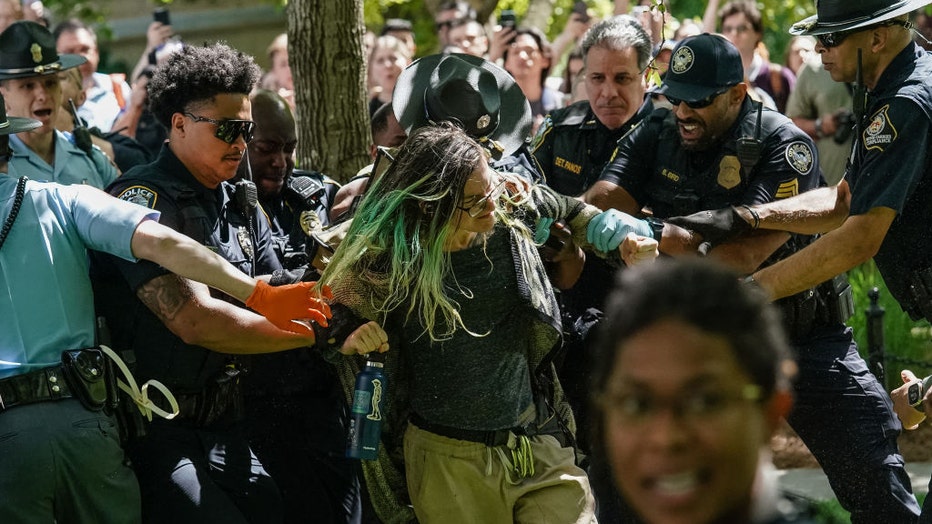Emory protest: University president 'devastated' by arrests of students, staff on campus

Emory students, faculty speak out against police
Emory University students and faculty continue to gather on campus speaking out against police action at an anti-war protest held last Thursday.
ATLANTA - Emory's president has apologized for mischaracterizing last week's pro-Palestinian protest as activists who were not members of the university community, but stood firm on his belief that encampments should not be on campus.
In a statement released on Monday, Emory University President Gregory L. Fenves said that he has heard from many students and faculty members and understands "your concerns, your fears, your frustrations, and your outrage."
Fenves's comments come days after activists protesting in support of Palestine and against the construction of Atlanta's planned public safety training facility set up tents at the university's Decatur campus on Thursday.
In response to the protest, a spokesperson for the university told media outlets that the encampment was set up by people "trespassing," claiming that they were "not members of our community."
"They are activists attempting to disrupt our university as our students finish classes and prepare for finals," Spokesperson Laura Diamond said. "Emory does not tolerate vandalism or other criminal activity on campus."
After ordering the group to leave, Emory contacted the Atlanta Police Department and Georgia State Patrol for assistance. The officers used Tasers and pepper balls to bring the crowd under control. Several people were placed in handcuffs and loaded into vans.

Police, protesters clash at Emory University
Demonstrators at Emory University have set up tents and spoke out against the Hamas Gaza war Thursday morning, but law enforcement took action when the protesters, who Emory officials say are not a part of their community, would not leave the campus.
Video circulated widely on social media shows two women who identified themselves as professors being detained, with one of them slammed to the ground by one officer as a second officer then pushes her chest and face onto a concrete sidewalk. In a separate incident Thursday evening, some protesters pinned police officers against the glass doors of the Candler School of Theology on the campus and threw objects at the officers, Emory’s president said.
MORE: Second day of pro-Palestinian protests at Emory University following arrests
In total, officials say 20 out of the 28 people arrested were "Emory community members."

Police officers arrest a demonstrator during a pro-Palestinian protest against the war in Gaza at Emory University on April 25, 2024, in Atlanta. (Photo by Elijah Nouvelage / AFP) (Photo by ELIJAH NOUVELAGE/AFP via Getty Images)
In his letter, Fenves apologized for the university's statement describing the group as trespassers, saying that "this information was not fully accurate."
"My goal was to remove a growing encampment, as allowing such an encampment would have been highly disruptive, affecting everything from classes and exams to our ability to hold Commencement," he wrote.

Pro-Palestinian protesters take over Emory food hall
A group of pro-Palestine protesters took over Cox Hall Food Court on the campus of Emory University in Atlanta on Friday, April 26, 2024.
Emory University responds to pro-Palestine protests
Fenves also wrote that he was "devastated" by the fact that students and staff members were arrested during the removal of the encampment, calling the videos "deeply distressing."
After the arrests, the university says it is launching a review "to develop recommendations to improve how that will keep our community safe," which will include how Emory uses external law enforcement agencies.
Still, Fenves said the university will not allow camps on its quadrangle.

Emory University pro-Palestine protests continue
Two groups held pro-Palestine demonstrations on Emory University's campus on April 27, 2024, following the influx of protests across college campuses in the U.S.
"We are working hard to keep our campus as free from disruption as possible so that these important core functions of the university can carry forward at the highest level," he wrote.
Pro-Palestine protests, arrests at colleges across America
Emory University's protest was just one of numerous student protests over the Israel-Hamas war that have popped up on campuses following last week’s arrest of more than demonstrators at Columbia University.
The students are calling for universities to separate themselves from any companies that are advancing Israel’s military efforts in Gaza — and in some cases from Israel itself.
Protests on many campuses have been orchestrated by coalitions of student groups. The groups largely act independently, though students say they’re inspired by peers at other universities.
Pro-Palestinian student protesters set up a tent encampment at the Ivy League university in New York last week. Police first tried to clear the encampment on April 18, when they arrested more than 100 protesters. But the move backfired, inspiring students across the country and motivating protesters at Columbia to regroup.
Earlier this week, the Ivy League school, where Monday is set to be the last day of classes, switched to hybrid learning. Commencement is set for May 15.
Students said Friday afternoon that they had reached an impasse with administrators and intended to continue their encampment until their demands were met. Columbia officials had earlier said that negotiations were showing progress. Despite dozens of journalists on campus and scores of police officers outside the gates, an unassuming spring day unfolded Friday with students sitting on the library’s steps or grabbing a quick bite while soon-to-be-graduates posed for photos in their powder-blue gowns.
In Georgia, a protest at the University of Georgia in Athens ended with multiple arrests on Monday morning after protesters set up a camp on the North Campus.
The Associated Press contributed to this report.

